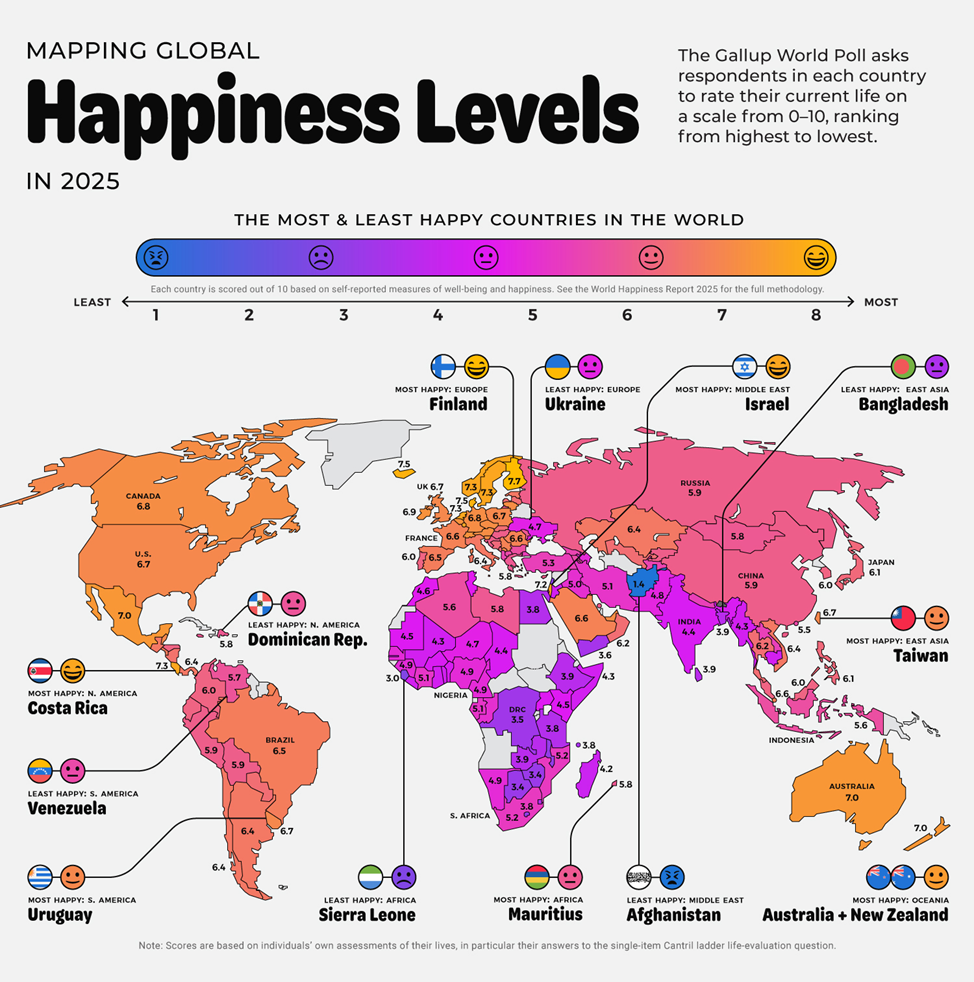Context:
- The World Happiness Report 2025 was recently released by the Wellbeing Research Centre, University of Oxford, in collaboration with Gallup, the UN Sustainable Development Solutions Network, and an independent editorial board. In this report, India was ranked 118 out of 147 countries, reflecting various factors that influence happiness and well-being.
Key findings of the report globally:
· For the seventh consecutive year, Finland has been named the happiest country in the world, followed by Denmark and Iceland. On the other hand, Afghanistan ranked the lowest, mainly due to hardships faced by its people, especially women. Sierra Leone and Lebanon were also among the least happy nations.
· The United States dropped to 24th place, its lowest ranking ever, mainly because of increasing loneliness and declining life satisfaction. Similarly, the United Kingdom ranked 23rd, its lowest position since 2017.
· Among India’s neighboring countries, China (68), Pakistan (109) and Nepal (92) ranked higher than India, while, Sri Lanka (133), and Bangladesh (134) ranked lower. A notable change this year was the entry of Costa Rica (6) and Mexico (10) into the top 10, showing that happiness is not just about economic wealth but also about social and cultural well-being.
India’s Performance in the 2025 Report
India’s happiness ranking has changed over the years. It was at its best in 2022 (94th place) and at its lowest in 2012 (144th place). In 2025, India performed differently across the six key factors:
- India ranked high in social support, as family bonds and community culture remain strong.
- Economic growth (GDP per capita) contributed positively, but India still lags behind wealthier nations.
- Healthy life expectancy has improved, though healthcare access remains a challenge.
- India scored the lowest in perceived freedom, meaning many people feel they have limited choices or control over their lives.
- Generosity and acts of kindness were a strong point for India.
- Corruption remains a major concern, lowering public trust in governance and institutions.

About World Happiness Report:
The World Happiness Report is based on a global survey where people rate their lives on a scale of 0-10, using a method called the Cantril Ladder. A score of 10 represents the best possible life, while 0 represents the worst possible life.
The rankings for 2025 are based on data collected from 2022 to 2024, using a three-year average to ensure consistency. The report does not rank countries based on a single number but instead considers six key factors that influence happiness:
1. GDP per Capita
2. Healthy Life Expectancy
3. Social Support
4. Perceived Freedom to Make Life Choices
5. Generosity
6. Perception of Corruption
Conclusion:
The 2025 report focused on "caring and sharing", meaning that people who help others and receive support tend to feel happier. While India's happiness ranking has improved, the report’s methodology raises some concerns. It does not fully reflect economic strength, healthcare quality, or governance effectiveness. The study found that happiness is not just about money or economic growth, but also about trust, social connections, and a sense of security.







